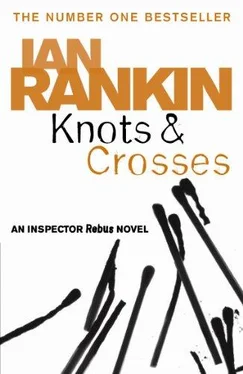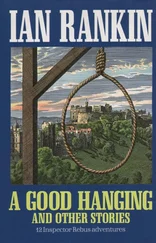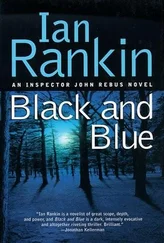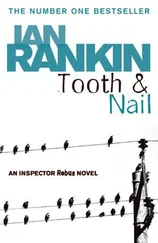Why did you leave the army ?
As she turned over, turning into the woman with the choking cries of his climax.
Why did you ?
Oh, oh, oh, oh.
Oh yes, the safety of dreams.
The editors loved what the Edinburgh Strangler was doing for the circulations of their newspapers. They loved the way his story grew almost organically, as though carefully nurtured. The modus operandi had altered ever so slightly for the killing of Nicola Turner. The Strangler had, it seemed, tied a knot in the cord prior to strangulation. This knot had pressed heavily on the girl’s throat, bruising it. The police did not consider this of much significance. They were too busy checking through the records of blue Ford Escorts to be busy with a slight detail of technique. They were out there checking every blue Escort in the area, questioning every owner, every driver.
Gill Templer had released details of the car to the press, hoping for a huge public response. It came: neighbours reported their neighbours, fathers their sons, wives their husbands, and husbands their wives. There were over two-hundred blue Escorts to investigate, and if nothing came of that, they would be re-investigated, before moving on to other colours of Ford Escort, other makes of light-blue saloon car. It might take months; certainly it would take weeks.
Jack Morton, another xeroxed list folded in his hand, had consulted his doctor about swollen feet. The doctor had told him that he walked too much in cheap, unsupportive shoes. This Morton already knew. He had now interviewed so many suspects that it was all becoming a blur to him. They all looked the same and acted the same: nervous, deferential, innocent. If only the Strangler would make a mistake. There were no clues worth going on. Morton suspected the car to be a false trail. No clues worth going on. He remembered John Rebus’s anonymous letters. There are clues everywhere. Could that be true of this case? Could the clues be too big to notice, or too abstract? Certainly it was a rare — an extraordinarily rare — murder case that did not have some bumper, extravagant clue lying about somewhere just waiting to be picked up. He was damned if he knew where this one was though, and that was why he had visited his doctor — hoping for some sympathy and a few days off. Rebus had landed on his feet again, lucky sod. Morton envied him his illness.
He parked his car on a double-yellow line outside the library and sauntered in. The great front hall reminded him of the days when he had used this library himself, clutching picture-books borrowed from the children’s section. It used to be situated downstairs. He wondered if it still was. His mother would give him the bus-fare, and he would come into town, ostensibly to change his library books, but really so that he could wander the streets for an hour or two, savouring the taste of what it would be like to be grown up and free. He would trail American tourists, taking note of their swaggering self-confidence and their bulging wallets and waistbands. He would watch them as they photographed Greyfriars Bobby’s statue across from the kirkyard. He had stared long and hard at the statue of the small dog, and had felt nothing. He had read of Covenanters, of Deacon Brodie, of public executions on the High Street, wondering what kind of city this was, and what kind of country. He shook his head now, past caring about fantasies, and went to the information desk.
‘Hello, Mister Morton.’
He turned to find a girl, more a young lady really, standing before him, a book clasped to her small chest. He frowned.
‘It’s me, Samantha Rebus.’
His eyes went wide.
‘Goodness, so it is. Well, well. You’ve certainly grown since I last saw you. Mind you, that must have been a year or two back. How are you?’
‘I’m fine, thanks. I’m here with my mother. Are you here on police business?’
‘Something like that, yes.’ Morton could feel her eyes burning into him. God, she had her father’s eyes all right. He had left his mark.
‘How’s dad keeping?’
To tell or not to tell. Why not tell her? Then again, was it his place to tell her?
‘He’s fine, so far as I know,’ he said, knowing this to be seventy-per-cent truth.
‘I’m just going down to the teenagers’ section. Mum’s in the Reference Room. It’s dead boring in there.’
‘I’ll go with you. That’s just where I was headed.’
She smiled at him, pleased about something that was going on in her adolescent head, and Jack Morton had the thought that she wasn’t at all like her father. She was far too nice and polite.
A fourth girl was missing. The outcome seemed a foregone conclusion. No bookie would have given odds.
‘We need special vigilance,’ stressed Anderson. ‘More officers are being drafted in tonight. Remember,’ the officers present looked hollow-eyed and demoralized, ‘if and when he kills this victim, he will attempt to dispose of the body, and if we can spot him doing that, or if any member of the public can spot him doing that, just once, then we’ve got him.’ Anderson slapped a fist into his open hand. Nobody seemed very cheered. So far the Strangler had dumped three corpses, quite successfully, in different areas of the city: Oxgangs, Haymarket, Colinton. The police could not be everywhere (though these days it seemed to the public that they were), no matter how hard they tried.
‘Again,’ continued the Chief Inspector, consulting a file, ‘the recent abduction seems to have little enough in common with the others. The victim’s name is Helen Abbot. Eight years of age, a bit younger than the others you’ll notice, light-brown shoulder-length hair. Last seen with her mother in a Princes Street store. The mother says that the girl simply disappeared. One minute there, the next minute gone, as was the case with the second victim.’
Gill Templer, thinking this over later, found it curious. The girls could not themselves have been abducted actually in the shops. That would have been impossible without screams, without witnesses. One member of the public had come forward to say that a girl resembling Mary Andrews — the second victim — had been seen by him climbing the steps from the National Gallery up towards The Mound. She had been alone, and had seemed happy enough. In which case, Gill mused, the girl had sneaked away from her mother. But why? For some secret rendezvous with someone she had known, someone who had turned out to be her killer? In that case, it seemed likely that all the girls had known their murderer, so they had to have something in common. Different schools, different friends, different ages. What was the common denominator?
She admitted defeat when her head started to hurt. Besides, she had reached John’s street and had other things to think about. He had sent her here to collect some clean clothes for his release, and to see if there were any mail, as well as to check that the central heating was working still. He had given her his key, and as she climbed the stairs, pinching her nose against the pervasive smell of cats, she felt a bond between John Rebus and herself. She wondered if the relationship were about to turn serious. He was a nice man, but a little hung-up, a little secretive. Maybe that was what she liked.
She opened his door, scooped up the few letters lying on the hall-carpet, and made a quick tour of the flat. Standing by the bedroom door, she recalled the passion of that night, the odour of which seemed to cling in the air still.
The pilot-light was lit. He would be surprised to learn that. What a lot of books he had, but then his wife had been an English teacher. She lifted some of them off the floor and arranged them on the empty shelves of the wall-unit. In the kitchen, she made herself some coffee and sat down to drink it black, looking over the mail. One bill, one circular, and one typed letter, posted in Edinburgh and three days ago at that. She stuffed the letters into her bag and went to inspect the wardrobe. Samantha’s room, she noted, was still locked. More memories pushed safely away. Poor John.
Читать дальше












